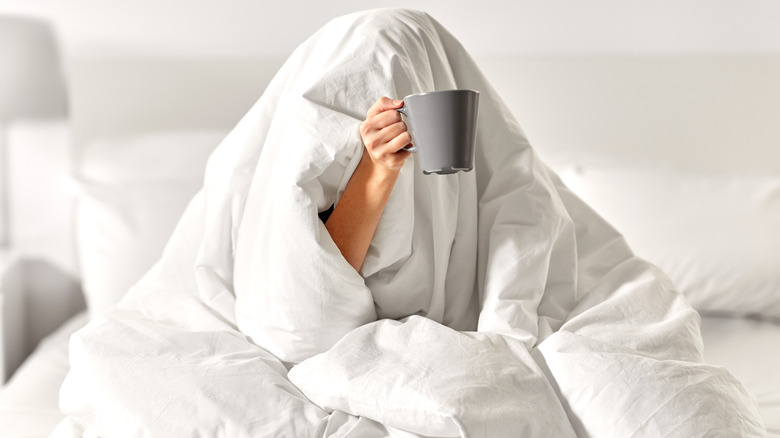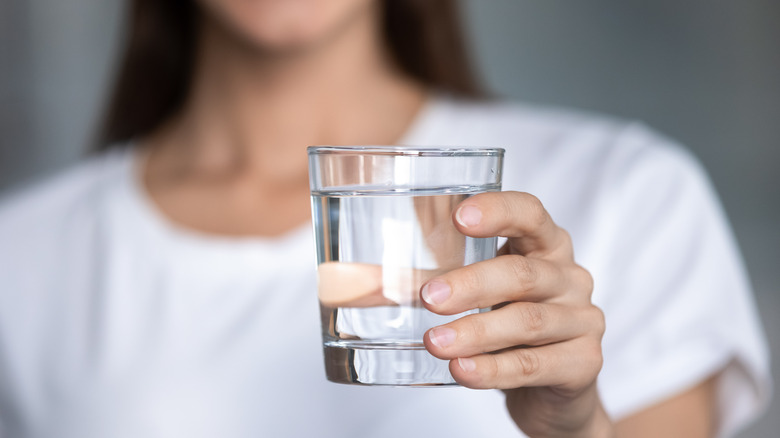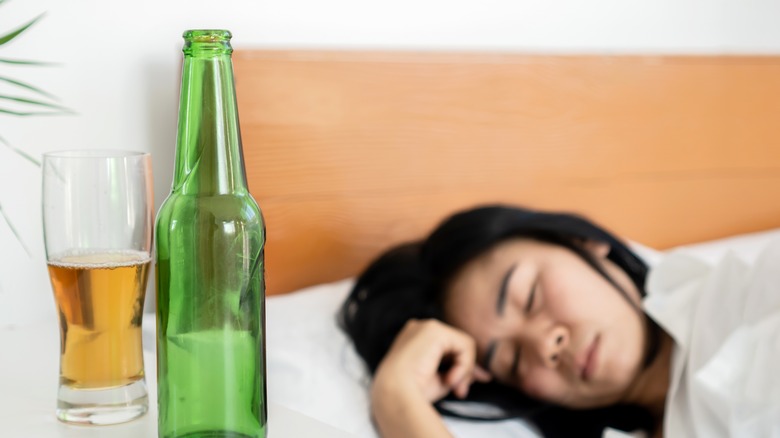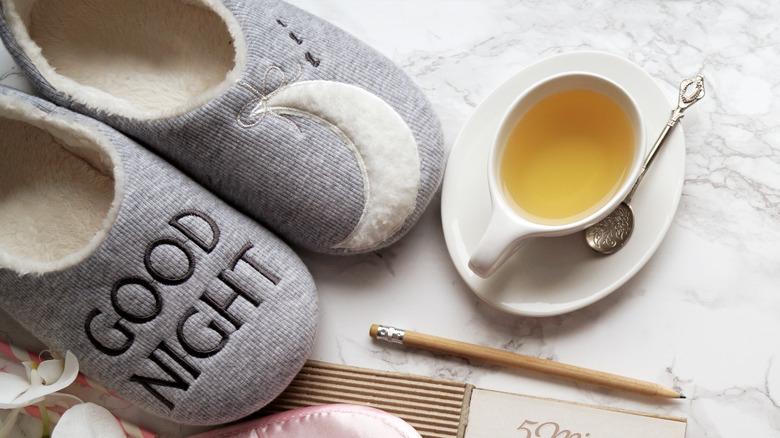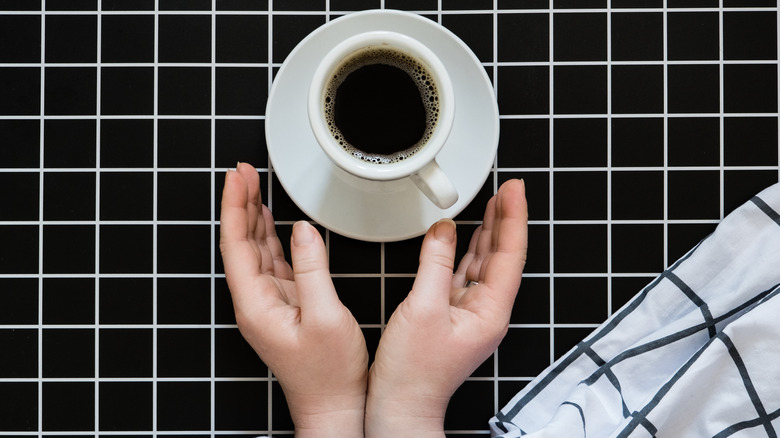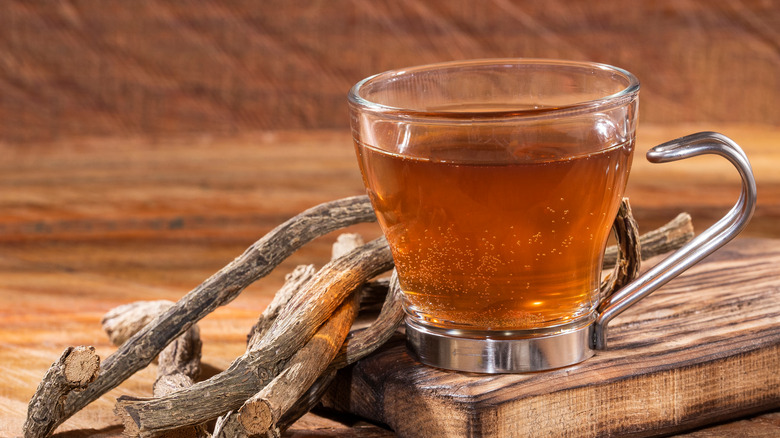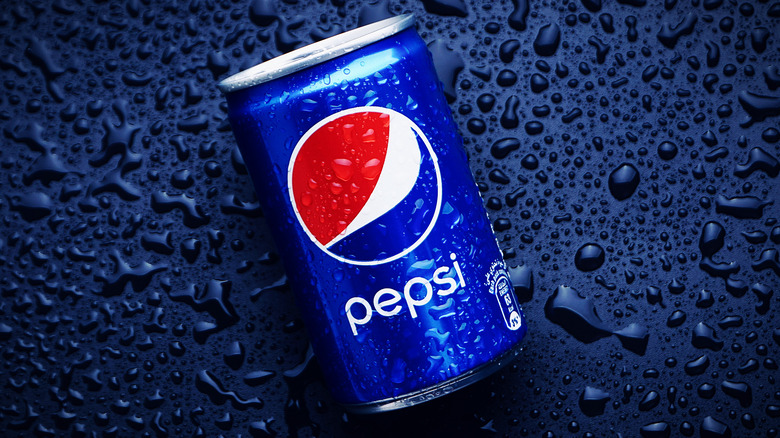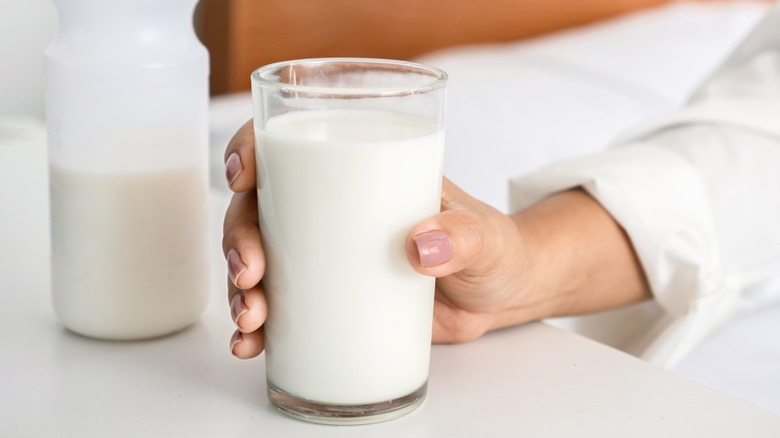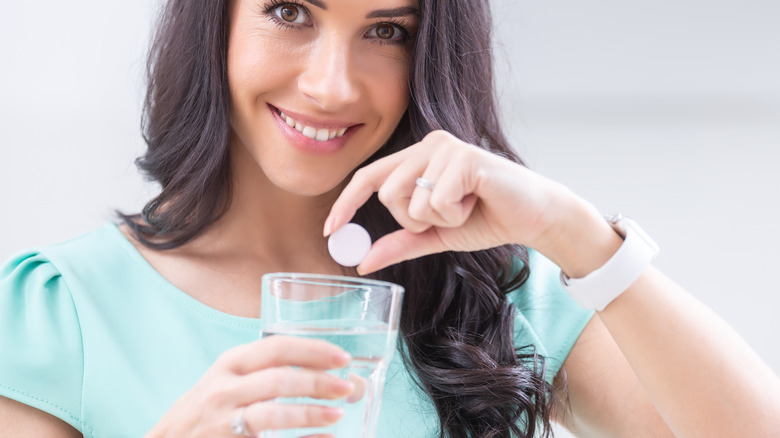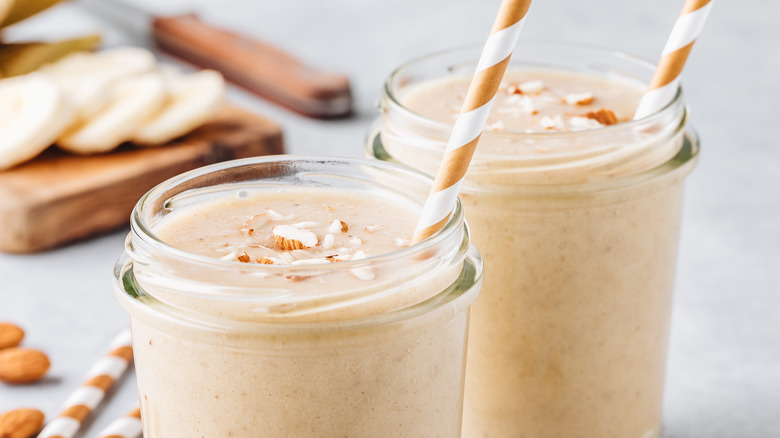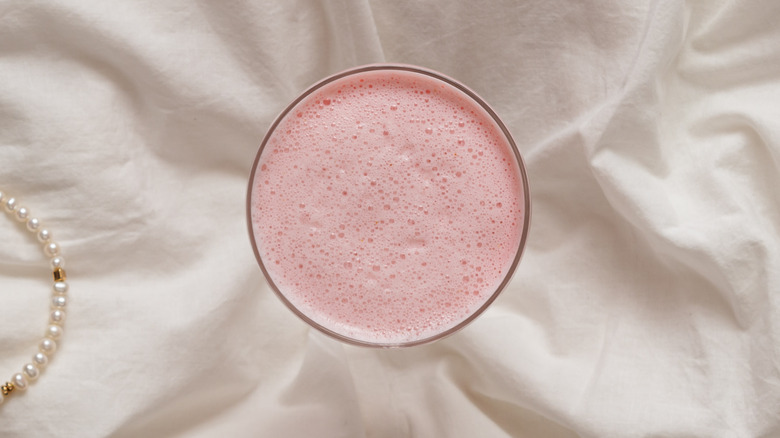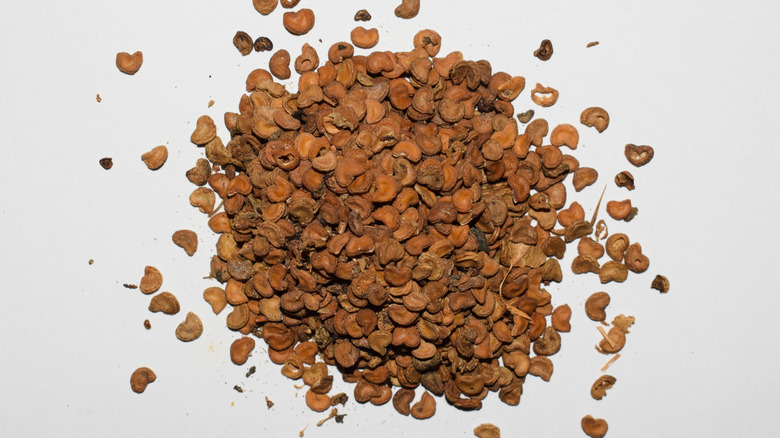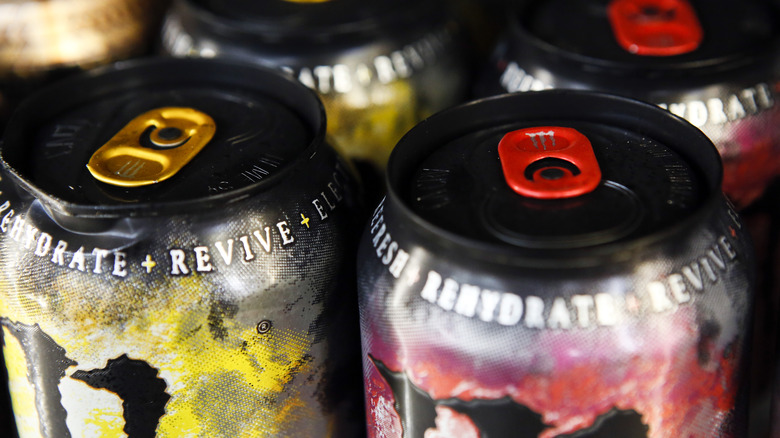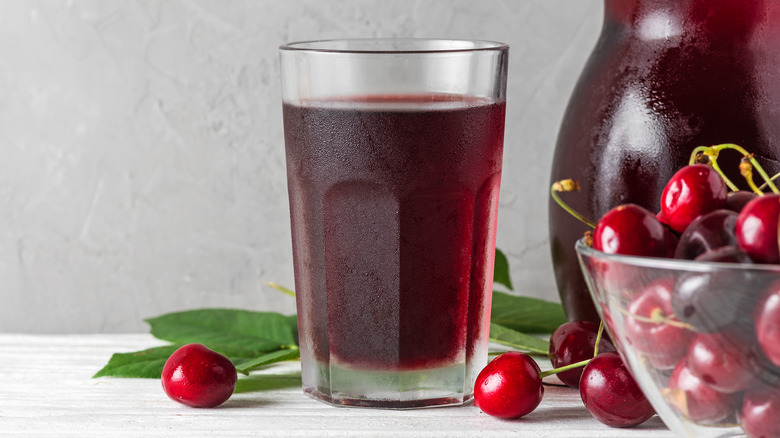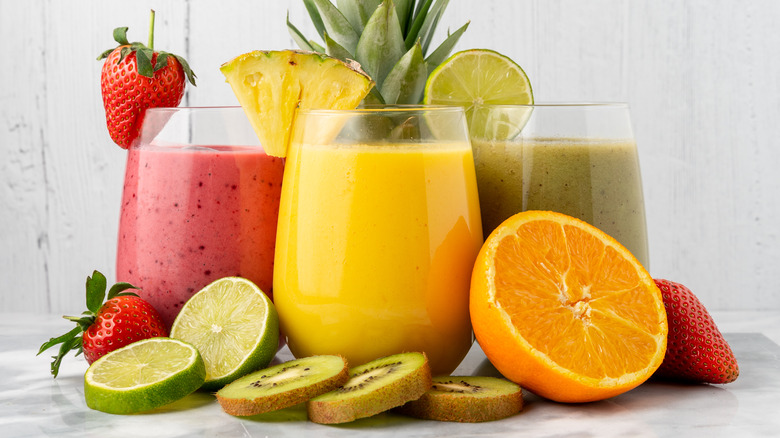7 Things You Should Drink Before Bed And 7 To Avoid
Ah, sleep. Precious sleep. Honestly, there are few things better than ending a long day by tumbling into bed with the promise of a good night's rest.
Unfortunately, the perfect stretch of sleep can be a little elusive for a surprisingly high number of people. Approximately 50-70 million Americans struggle with regular good sleep, and this number has risen significantly in the last 30 years or so, according to SleepHealth. And over time, chronic poor sleep and sleep deprivation won't just leave you feeling exhausted. It is also associated with a large range of health conditions like impaired cognitive function, high blood pressure, and greater risk of cardiovascular illness (per the Cleveland Clinic).
And given that sleep is influenced by a huge number of dietary factors, it makes sense that what we drink can affect it, too. Just like what we eat, our beverage choices can sometimes make or break a good night's sleep. And there might be some surprising culprits for bad rest hiding in plain sight — as well as some drinks you might not expect that can help you get those ZZZs. Let's take a look in this article.
Drink: water
Has water ever let you down? In addition to being, quite literally, the elixir of life and all that is good and healthy, water is also your best friend when it comes to getting a good night's sleep.
"By drinking water just before bed, you help keep your body hydrated, which prevents headaches and maintains your core body temperature, helping you sleep longer," states nutritional practitioner Daniel Harris (via HuffPost). Drinking water before bed is also particularly useful for those who live in hotter climates, as it helps stimulate sweat production. The sweat keeps us cool, and the water drunk helps replace the hydration lost during sweating, says the Sleep Foundation.
Drinking water before bed also helps if you're feeling under the weather with cold or flu symptoms. As Harris explains, when our noses are blocked, we breathe through our mouths instead. This can cause us to become dehydrated faster, and drinking a glass of H2O will help keep you topped up, promoting good sleep. However, there's one thing you have to watch out for when it comes to drinking too much water before bed: Needing to pee. "Drinking right before bed can cause nocturia – the increased need to urinate during the night," Harris says. Over time, this disruption to your sleep cycle can impact your day-to-day activities through tiredness, lack of concentration, and trouble with memory. It's advisable to stick to just a small glass of water before bed — or ideally, stay hydrated throughout the day.
Avoid: alcohol
The image of people nursing a relaxing nightcap before they head off to a night of deep, disturbance-free sleep is pretty much as old as the hills. But in fact, drinking alcohol before bed is one of the worst things you can do for a good night's rest.
Drinking alcohol can be a cause of insomnia thanks to the impact that alcohol has on hormone release, according to Piedmont's sleep medicine specialist and pulmonologist Aristidis Iatridis (via Piedmont). "There's some evidence that alcohol actually disrupts the release of melatonin in your brain. Melatonin is the hormone that your brain releases when it wants to go to sleep," says Iatridis. Due to this melatonin release, people can then end up experiencing disrupted, irregular sleep, and "wake up in the morning not feeling as rested as they should."
Not only that, but alcohol can prevent you from reaching the levels of REM sleep you need. "It's probably the most restorative sleep. And alcohol can reduce the amount of REM sleep you have at night," Iatridis states. Ideally, people should try and stop drinking alcohol at least four hours before they head to bed. It's also wise to drink lower quantities of alcohol overall, so that it doesn't linger in your system and stop you from getting your precious slumber.
Drink: chamomile tea
Chamomile tea has long been promoted as a drink that helps you relax, and so when it comes to sleep, it could be a perfect choice. This is mostly down to chamomile tea's composition, which includes the antioxidant apigenin (per Healthline). As discussed in research published in Molecular Medicine Reports, apigenin interacts with the receptors in our brain that then help usher in a depressive effect, helping us feel sleepier and sleep better.
Chamomile tea's effects can be seen in action in a study published in the Journal of Advanced Nursing, which looked at the impact of drinking chamomile tea on a group of 80 postnatal women experiencing poorer sleep. The participants drinking chamomile tea had much higher levels of sleep quality than those who didn't, and showed reduced symptoms of depression. It's worth bearing in mind, however, that further studies are needed to help determine chamomile tea's exact effects on sleep health, and the tea shouldn't be used as a substitute for treatment for depression (via Healthline).
Avoid: coffee
Okay, so this one might not come as the greatest shock of all time, but it's still worth saying: Coffee is not your best friend when it comes to sleep.
Naturally, it all comes down to the abundant caffeine in the drink. When you drink beverages containing caffeine (a single cup of coffee contains between 95 mg and 200 mg of the stuff, says the Sleep Foundation), it gets absorbed into your bloodstream and hits your brain. It takes from half an hour to a full hour for it to peak in your system, during which time it's blocking your adenosine receptors (and the production of the adenosine needed to promote healthy sleep).
This is why caffeine helps us stay feeling awake and alert — and why it's such a problem drinking things containing it before bed. Caffeine also disrupts our circadian rhythm, our natural bodily cycle that helps us to regulate our most alert and sleepy periods during the day (per the National Institute of General Medical Sciences). Add to that the fact that caffeine takes a pretty long time to clear through our system — with it taking four to six hours to reach its half-life in our bodies — and it becomes rather apparent why it's a bad idea.
Drink: Valerian tea
Valerian tea might not be your first port of call for a good night's sleep, but it could be worth giving it a try. Valerian's popularity has been on the rise, and when it comes to sleep, it might be for good reason.
The effects of valerian in promoting better sleep have been observed in a study published in Complementary Therapies in Clinical Practice. The researchers found that a combination of valerian and lemon balm, used among menopausal women, seemed to assist in improved sleep quality.
Despite this, research on valerian's effects remains inconsistent, and the National Center for Complementary and Integrative Health states that there isn't sufficient evidence to explicitly recommend it as a sleep aid. However, short-term use of valerian is generally safe, and so if you fancy giving valerian tea a try, you can whip up your own at home. Simply buy yourself some valerian tea bags and make as you would a normal cup, or some loose leaf valerian and brew an infusion for yourself (per Everyday Health). Ideally, consume it 30 minutes to two hours before heading to bed.
Avoid: soda
You might not be able to get through your day without a soda fix, but we'd recommend trying to avoid leaving it until before bedtime to crack one open.
While soda can help you feel refreshed, when it comes to sleep, it may not be so helpful, with the first potential issue coming from your soda's caffeine levels (per the Sleep Foundation). Some sodas can contain higher levels of caffeine, which increases your alertness and reduces your brain's capacity to produce sleep-promoting chemicals, inhibiting sleep.
In addition to this, the bubbles in soda can keep you up at night. Soda, along with other carbonated drinks, can help increase the possibility of uncomfortable heartburn symptoms and sleep disruption. Carbonated drinks can also make you need to pee more in the night, which may disrupt your natural sleep rhythm, says the Sleep Foundation. It's for all of these reasons why Dana Hunnes, UCLA Fielding School of Public Health professor and the Ronald Reagan UCLA Medical Center's senior registered dietitian, recommends keeping soda at bay far before bedtime. "I would probably limit soda to no closer than three to four hours before bed without caffeine, and eight hours if it has caffeine," Hunnes told Everyday Health.
Drink: warm milk
There's a very good reason why your Mom made you a cup of warm milk when you were having trouble sleeping. As it turns out, warm milk could actually be a great sleep aid, and not just because it's comforting. MIlk contains compounds like melatonin and tryptophan, both of which can help to promote a healthier sleep cycle (per Healthline). Melatonin, which is also called the sleep hormone, helps your body relax and ready itself for sleep. Tryptophan, on the other hand, is an amino acid that helps our brains produce serotonin, which is involved with melatonin production and which can help us relax.
But in addition to this, that warm, fuzzy feeling you get when you drink a glass of heated-up milk? It's theorized that the association we have with warm milk being something soothing that we had during childhood could add significantly to its effects as a sleep aid. Bear in mind that more research needs to be conducted on the effects of warm milk on sleep specifically, but as far as drinks go, you could do far worse than a comforting cup of milk before bedtime.
Avoid (sort of): magnesium drinks
As the food and drink market continues to expand and offer new things, beverages containing added essential vitamins and minerals continue to gain speed. And one subsection of these, drinks infused with magnesium, have sometimes been touted as effective aids for sleep.
But before you head out and stock up your fridge with every magnesium-infused drink you can find, it's worth knowing that they may not be that effective, says senior registered dietitian Dana Hunnes to Everyday Health. Although Hunnes does recognize that these drinks could provide some of the benefits that magnesium offers (such as bringing down blood pressure and helping melatonin production), the fact is that they may not have enough magnesium in them to make that much of a difference.
In fact, magnesium as a supplement in general may not be that helpful for sleep, says integrative medicine specialist Naoki Umeda to the Cleveland Clinic. The evidence for its supplementary help as a sleep aid is somewhat lacking, Umeda states –and to add to that, you probably get enough from your diet, anyway. "It's widely available in both plant and animal foods such as dairy products, leafy greens, nuts, legumes and whole grains. And magnesium deficiency is rare in healthy people."
Drink: banana smoothies
We'd say that a banana smoothie would be a good choice any time of the day (for real, we love them, we can't lie — an underrated drink!), but before bedtime, they could be particularly helpful.
Making a banana smoothie gives you all of the nutrient goodies in bananas that can help promote good sleep, like potassium, magnesium, tryptophan, and melatonin (via Healthline). While all of these nutrients aid our bodies and brains to wind down, it's the superlative potassium content of bananas that could be particularly helpful. Potassium helps lower blood pressure, maintain our central nervous system, and keep the muscles strong (per WebMD). According to a 1991 study published in Sleep, it could also help us achieve better quality overall sleep.
As Healthline recommends, a banana smoothie with almond milk could help boost your tryptophan and melatonin levels even further, making it a much more potent sleep aid. Just make sure that you're not loading your banana smoothie with sugar, as this can cause your blood sugar to spike pre-bedtime. The natural sweetness of the bananas should be more than sufficient.
Avoid: milkshakes
There's nothing like a milkshake in the middle of summer. Or winter. Or ... spring ... Okay, you get it, we love milkshakes. But timing when you have yours may be the difference between a good night's sleep and a bad one.
The reason why milkshakes could be disruptive to sleep is due to their high levels of saturated fat and sugar. The saturated dairy fats in milkshakes and their sugary syrups, as part of diets that are generally higher in these two components, can both contribute to poorer sleep overall, lacking in depth and frequently disrupted, according to a study published in the Journal of Clinical Sleep Medicine.
But even for folks who have a diet lower in saturated fats and sugars, milkshakes before bed could still be problematic for sleep. High saturated fat intake is associated with higher incidences of digestive issues and acid reflux, as a study published in the International Journal of Cancer found. The gastrointestinal symptoms that occur following saturated fat intake could keep you up at night and cause you to wake from sleep more frequently.
Drink: Ashwagandha tea
If you're looking to nod off a little quicker at the end of a hard day, Ashwagandha tea could be your greatest ally. The herbal aid, used in the Ayurveda medicine system as part of treatment for multiple conditions (per the Sleep Foundation), contains several ingredients such as withanolides and triethylene glycol that may help take us to the land of rest. Early research on Ashwagandha helping with sleep has been positive so far, with one study published in Sleep Medicine producing particularly good results. After examining adults who took Ashwagandha for six weeks, the study found that overall sleep quality was improved for the participants by 72%.
Ashwagandha may also help to reduce stress levels, thanks to the withanolides present in the herb. Ashwagandha can come in many forms, but to make it in a tea from scratch, get hold of some root powder from a nearby health store or online (per Topic Tea). Simply boil a cup of water and mix in a teaspoon of root powder, leaving it to brew for 10-15 minutes. Strain it out into a cup of your choice, and enjoy it before bedtime.
Avoid: energy drinks
Alright, so we implore you not to roll your eyes at this one. But although it may feel like the most obvious statement on earth, energy drinks are not going to help you sleep.
The reason boils down to the caffeine present in energy drinks, which disrupts the body's circadian rhythm and adenosine production (via Verywell Health). This adenosine, which helps us sleep, is limited by the presence of caffeine in our system, leading to a poor night's rest.
But it's also worth pointing out exactly how much caffeine is present in energy drinks. Some energy drink products such as Hyde Extreme contain a frankly eye-watering four hundred milligrams of caffeine per serving, according to Caffeine Informer. When you consider the fact that that's more than four times the amount of caffeine in the average 8 oz cup of coffee (per Healthline), it becomes pretty clear why energy drinks are best left avoided anywhere near bedtime. It's recommended to avoid caffeinated drinks for up to six hours before bedtime, states the FDA, who also identify 400 mg as the upper limit that can be safely consumed by most adults per day.
Drink: cherry juice
Cherry juice may not be your go-to drink before bed time, but if you're having trouble sleeping, you might want to consider getting a carton next time you're at the store.
As fruits go, tart cherries can be particularly useful for good sleep hygiene. "Tart cherries are rich in melatonin, the sleep-inducing hormone that we naturally create," states senior registered dietitian Dana Hunnes to Everyday Health. In fact, neurology professor and UCLA's Sleep Disorders Center director Alon Avidan extols the virtues of tart cherry juice to his own patients struggling with sleep, recognizing that "there is published data that shows that there is a positive effect on two attributes related to sleep — sleep latency (how long it takes one to fall asleep) and an improvement in the time that people are remaining awake during the night."
Unfortunately, cherry juice isn't without its drawbacks. Brands that are higher in sugar may prove disruptive to sleep, as sugars can promote more frequent urination, Hunnes says. This might mean that you'll find yourself going to the bathroom in the night more (and feeling more tired as a result the next day). If you're opting for cherry juice, we recommend going for the lowest-sugar brand you can find.
Avoid: fruit juice
If you've got a carton of fruit juice in the fridge that you thought you might finish off before bed tonight, read this first.
The high sugars present in most fruit juices can wreak havoc on your sleep, according to the Sleep Foundation. While high-sugar diets can help people fall asleep quicker, it also reduces the overall quality of your sleep, can cause you to wake up more frequently, and results in you having lighter sleep throughout the night. This can lead to your hormones being destabilized the following day, says Livestrong.
In fact, diets that include fruit juice as part of an overall higher-sugar diet may contribute to increased occurrences of insomnia, as seen in a study published in The American Journal of Clinical Nutrition. The hormone disruption that occurs as a result of high-sugar intake can also contribute to overall weight gain (per Livestrong). Drinking fruit juice at night may produce a more potent effect with regard to its impact on overall weight gain, according to a study published in the International Journal of Obesity, which found that consuming foods and drinks later on in the day can affect metabolism and how the body processes glucose.

